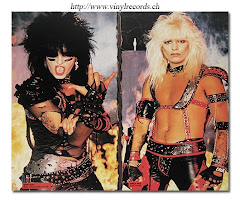Monday, September 28, 2009
boyz n the hood
It's rather upsetting to me that gender issues often lead to women's rights issues, as if men don't have their own struggles with creating identities or places for themselves in society. In the film, we definitely see our main characters - Tre, Doughboy, and Ricky - trying to find their own identities and places as they deal with the everyday troubles of living in 'the hood'. A lot of their growing up deals with 'being a man' and learning to cope with their lives as the tough black men of the neighborhood. There are two examples for the boys to look to, and these two extremes portray the positive masculinity or the more dangerous, cool masculinity that they can follow. Tre's father is definitely the much more positive influence: he is a working businessman who sets up his own real estate. He reads books, and continuously reminds the boys of the mistakes he's made in order for them to learn from him. From the point of view of a person not in their situation, Tre's dad is the positive masculinity who is working to separate himself from the stereotypes, dangers, and disappointments of 'the hood' - his toughness is more mental than physical. On the flip side of the spectrum, Doughboy and his gang represent the more dangerous side of masculinity in the neighborhood: they drink, chase girls, get into fights, and visually and audibly represent the stereotypes that Tre's father tries to avoid and keep his son away from. They emote a more physical masculinity: a toughness that they cling to in order to survive in their neighborhood. In the middle are Ricky and Tre, who can see the fun wild side of being a dangerous hoodlum, but are also swayed by the deep words of Tre's father and the idea of being able to get away from the dangers of their home. Ironically, the masculinity that they try to portray is very stereotypically African American: they are either completely fitting in with the dangerous hood or doing everything in their power to get out. These stereotypes, though probably created based on experience adn observations, are stereotypes created by other races to generalize the African American adolescents in the neighborhood. Race, then, defines the stereotypes because it only uses African American stereotypes to create a good and a bad type of boy in the movie - the dichotomy is directly based off a racial stereotype. Ricky and Tre are anomalies in that their sports skills or their academic success allow them to even dream of escaping the hood that has made them into men.
While the men are actively attempting to find their places, the women are given much more passive roles in the movie. One of the most independent women, Tre's mom, is important because of her strong belief in education. However, she quickly disappears from the storyline after handing Tre over to his dad, showing the emphasis on men teaching other men how to be men. Masculinity and being tough, a major theme of the movie and surviving the hood, is something that women can only be a part of in that they must be taken advantage of. We see this between Tre and his girlfriend, when he is overly eager to have sex with her, especially when teased by his friends. Though she uses religion as a pretext for keeping him off her, her much calmer family life and attachment to religion make her an outsider-within in the hood. She has family and religious values that keep her stable, but also make her very different from the drug addicted or rather promiscuous other women portrayed in the movie. All of the other girls and women show no signs of interest in education or getting out of the hood in actual actions, though they may voice hope - like Ricky's mom - for their friends or family getting out of the hood. In that sense, Brandi is a very active agent simply because she is the only woman making an effort to leave the hood.
While the men are actively attempting to find their places, the women are given much more passive roles in the movie. One of the most independent women, Tre's mom, is important because of her strong belief in education. However, she quickly disappears from the storyline after handing Tre over to his dad, showing the emphasis on men teaching other men how to be men. Masculinity and being tough, a major theme of the movie and surviving the hood, is something that women can only be a part of in that they must be taken advantage of. We see this between Tre and his girlfriend, when he is overly eager to have sex with her, especially when teased by his friends. Though she uses religion as a pretext for keeping him off her, her much calmer family life and attachment to religion make her an outsider-within in the hood. She has family and religious values that keep her stable, but also make her very different from the drug addicted or rather promiscuous other women portrayed in the movie. All of the other girls and women show no signs of interest in education or getting out of the hood in actual actions, though they may voice hope - like Ricky's mom - for their friends or family getting out of the hood. In that sense, Brandi is a very active agent simply because she is the only woman making an effort to leave the hood.
Subscribe to:
Post Comments (Atom)


No comments:
Post a Comment
Note: Only a member of this blog may post a comment.